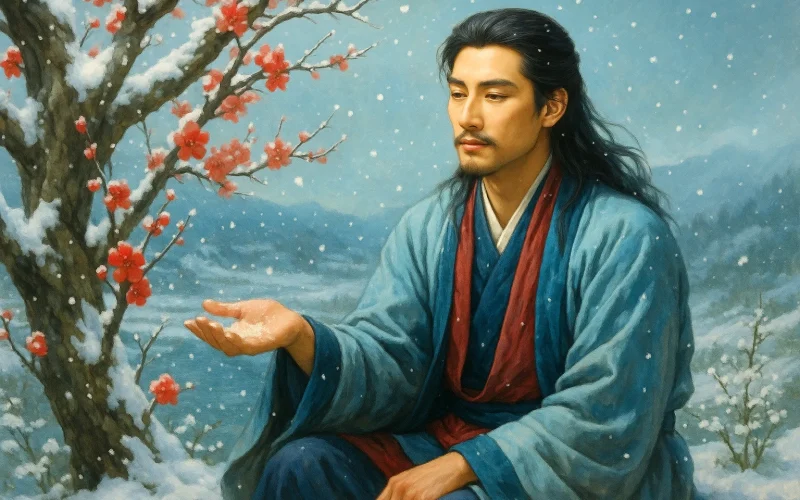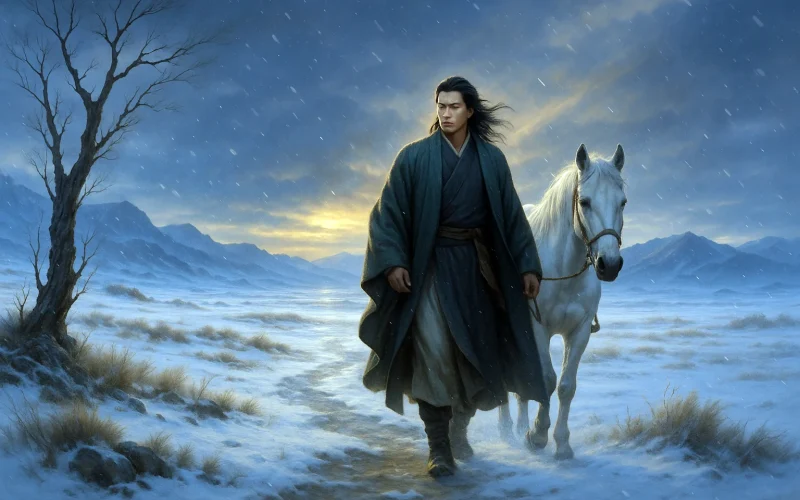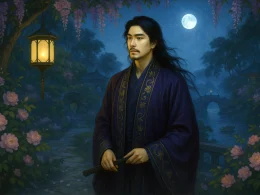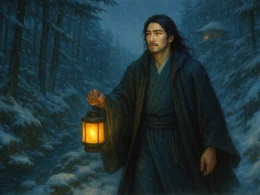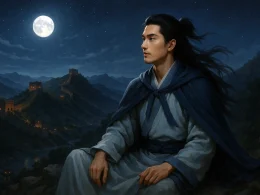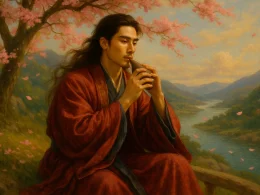Jiang Kui (c. 1155 - 1221), a native of Poyang, Jiangxi, was a master of ci poetry in the Southern Song dynasty. Though never holding official rank, he traveled the Jiangnan region as a literary companion, associating with figures like Fan Chengda and Yang Wanli. His ci works, characterized by an ethereal austerity, often used imagery of cold moons and subtle fragrances to convey grief for his country, earning Zhang Yan's praise as the exemplar of "crystalline purity and classical restraint" (清空雅正). A true polymath of Southern Song arts.
Major Works
Life and Career
Early Years
Born into a scholar-official family with cultural roots tracing back to the Tang dynasty—his distant ancestor Jiang Gongfu served as chancellor under Emperor Dezong—Jiang Kui inherited a profound cultural legacy. His father, Jiang E, earned the jinshi degree in 1148, the same year as Neo-Confucian giant Zhu Xi, providing Jiang Kui with rigorous scholarly training. His mother, née Huang, came from a literary family; her father Huang Ding was a renowned local scholar. This dual heritage nurtured his precocious literary talent.
By age seven, Jiang Kui began studying the Classic of Poetry (毛诗), demonstrating a prodigious memory capable of reciting thousands of characters daily. At ten, his father personally taught him the Rites of Zhou (周礼) and Records of Music (乐记), laying the groundwork for his later achievements in ci music. Notably, the Jiang family library housed over 3,000 volumes, including rare musical treatises like Qin Cao (琴操) and Yuefu Miscellaneous Records (乐府杂录), which deeply influenced his artistic development.
Career and Struggles
Jiang Kui's path in the imperial examinations was fraught with setbacks. In 1174, at nineteen, he took the provincial exam, composing the ci poem Summoning Horn (角招) to declare his aspirations—revealing his early literary brilliance. Yet repeated failures followed, with the 1180 defeat particularly devastating, as reflected in lines like "The taste of exile— / I lean on wine to purge my sorrow" from Fourfold Delicate Intricacies (玲珑四犯).
Three factors led him to abandon official pursuits: financial strain from repeated exams (his family fortunes had declined); severe eye disease ("my sick eyes dim and bleary", Remembering the Prince’s Grandson (忆王孙)); and political persecution during the Qingyuan era’s ban on "False Learning" (庆元党禁), which alienated him from bureaucracy. These adversities redirected him to pure artistic creation, cementing his unique ci legacy.
Literary Achievements
pillar of Southern Song ci poetry, Jiang Kui rivaled Xin Qiji as one of the "Two Peaks" (辛姜) of the genre. His innovations include:
Synthesis of Styles: Blending the lyrical subtlety of late Tang ci with the boldness of heroic ci, he balanced grace and vigor. His emphasis on "meter and tonal patterns" (声律与格调) brought unprecedented rigor and musicality to the form.
Musical Mastery: A composer and qin virtuoso, he authored Qin Cao (琴操), advancing both theory and practice. His ci were designed for singing, with impeccable rhythm and classical allusions reflecting deep erudition.
Artistic Style
- Ethereal Elegance: His works exude a refined detachment, conveying emotion through subtle natural imagery ("cold moons, hidden fragrances").
- Metrical Precision: As a musician, he crafted ci with flawless tonal patterns, creating a lyrical cadence.
- Restrained Depth: Emotions—longing, melancholy, patriotism—are hinted at through seasonal motifs and landscapes.
- Scholarly Allusion: His ci weave classical references into rich philosophical tapestries.
Legacy
Qing critic Zhu Yizun hailed him as "the orthodox master of ci," while Wang Guowei, though critiquing his "limited imaginative scope," admired his stylistic heights. Modern scholars like Xia Chengtao (Chronological Annotations of Jiang Baishi’s Ci) and musicologist Yang Yinliu’s deciphering of his musical scores have resurrected these long-dormant artistic treasures.






